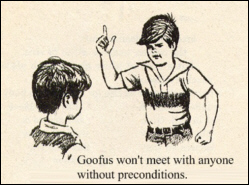West Coast Productions v. Does 1 – 5,829, — F.Supp.2d —, 2011 WL 2292239 (D.D.C. June 10, 2011)
The judge in one of the well-known mass copyright cases filed by Dunlap, Grubb & Weaver a/k/a U.S. Copyright Group (West Coast Productions v. Does 1 – 5,829) has issued an order denying motions to quash filed by several of the unnamed defendants. Plaintiff had served subpoenas on the ISPs associated with the IP addresses allegedly involved in Bittorrent activity, seeking to learn the identity of those account holders.
The ruling is potentially troubling because the court refused to even consider the arguments presented by those anonymous parties who did not reveal their identity in connection with the motion to quash. Such an approach undermines, and indeed comes close to refusing altogether to recognize any privacy interest that a person may have concerning his or her ISP account information.
The court observed that the Federal Rules of Civil Procedure require that a party must identify himself or herself in the papers filed with the court. In some situations, however, a court may grant a “rare dispensation” of anonymity after taking into account the risk of unfairness to the party seeking anonymity as well as the general presumption of openness in judicial proceedings.
In this case, the court noted that other courts had “uniformly held that the privacy interest in [ISP account] information is minimal and not significant enough to warrant the special dispensation of anonymous filing.”
Absent from the court’s analysis was the potential for harm to defendants who were the subject of these subpoenas but might have the ability to demonstrate (anonymously) that they were not involved. In cases involving adult content, in particular, the harm of being publicly associated with that content — even if the association turns out to be in error — is one that should not be disregarded in this way. Moreover, taking away the ability of an anonymous defendant to challenge his unmasking will encourage extortionate-like behavior on the part of copyright plaintiffs hoping to extract a settlement early in the case. If writing a check is the only way to keep from having to turn one’s name over (and this case pretty much establishes that rule), then more settlements should be expected.
The court went on to reject the arguments in favor of motions to quash filed by John Does who had provided their contact information to the court. The court found that it was premature to rule on any objections based on a lack of personal jurisdiction because the defendants filing the motions had not actually been named as a party. And the court rejected the arguments that the defendants were improperly joined into the action, noting the allegations in the complaint that the IP addresses were involved in a single Bittorrent swarm.
Evan Brown is a Chicago-based attorney practicing technology and intellectual property law. Send email to ebrown@internetcases.com, call (630) 362-7237, follow on Twitter at @internetcases, and be sure to like Internet Cases on Facebook.



